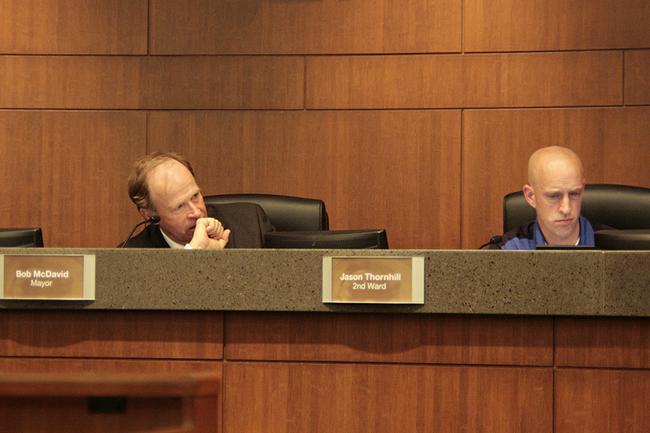
An ordinance increasing parking rates to 60 cents per hour and extending rate enforcement by three hours, until 9 p.m. was debated and tabled for 45 days by the Columbia City Council on Monday.
The city estimates the measure, which the council will vote on at its first meeting in June, would result in $597,000 in new revenue.
Mayor Bob McDavid said he was concerned about passing the parking meter increase with critical components missing. McDavid alluded to a hypothetical alternative in which campus meter rates would be increased from 50 to 75 cents per hour instead of raising rates in the downtown garages.
The revenue collected from increased parking rates and extended hours on fines would go toward the construction of a new parking garage on Short Street and Broadway. McDavid said no matter what council members do there will still be a risk the parking garage will not be built, and there is uncertainty regarding stakeholder support.
“They came to us saying they wanted a TIF,” McDavid said. “They didn’t say they wanted a hotel.”
A TIF, or tax increment financing, is a financing method which subsidizes community development. Developers of Broadway Lodging were approved to receive $3.2 million of TIF funding in February for the demolition of the Regency Hotel on Short Street and Broadway.
A new hotel is planned to replace the building afterward. The acquisition for the land to build the new garage on is already complete, but there is no legal requirement for the hotel to actually be constructed.
Second Ward Councilman Jason Thornhill agreed with the concern over financing for the new parking garage on Short Street.
“We can’t buy a million dollar piece of dirt if we’re not going to put a garage on it,” Thornhill said.
Public comments regarding parking meter fine changes will not be allowed before the ordinance is voted on in June, though there is schedule time allotted for public comment at the beginning of each meeting.
The council also moved to unanimously approve a pilot program for “no pick-up zones” for taxis downtown at certain late-night hours. Based on an informal agreement with five taxi companies, the pilot program will exclude certain streets in the busy downtown areas from allowing taxis to pick-up fares from 9 p.m. until 2:30 a.m.
The program is voluntary on the taxi companies’ part and is scheduled from May through July, a time when many students are out of the city.
“It might be good to do it when there are less students, as a pilot,” Sixth Ward Councilwoman Barbara Hoppe said.
Council members said reducing traffic problems caused by double-parking downtown is the reasoning behind implementing the program.
As a follow-up to previous council discussion regarding how to curb over-occupancy, a new ordinance has been approved allowing the city more opportunities to inspect rental properties for occupancy violations.
The time between property inspections is six years without reported code violations and up to three years if complaints have been filed.
The ordinance is specifically geared to the transfer of rental property ownership, but the effect will be increased inspections. As a provision of the ordinance, any property, which has not had a complaint or code violations within 18 months of the transfer will not be subject to a new inspection.